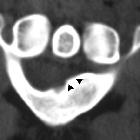median nerve entrapment syndromes








Entrapment syndromes of the median nerve represent the median nerve being compressed at a number of distinct sites leading to a number of distinct clinical syndromes.
Entrapment is but one of the gamut of pathologies causing neuropathy, albeit one of the more common etiologies and, more importantly for radiologists, one of the causes of neuropathy in which radiology can play a vital role in diagnosis. Entrapment syndromes, as a rule, affect nerves at defined anatomical locations, facilitating a more focused search for causative lesions. The three most common median nerve entrapment syndromes are:
- pronator teres syndrome (PTS)
- anterior interosseous nerve syndrome (AINS) (aka Kiloh-Nevin syndrome)
- carpal tunnel syndrome (CTS)
Rarely, the median nerve may be compressed by thickened lacertus fibrosus, Struthers ligament, or Gantzer muscle.
This article gives a short overview of these three syndromes focusing on pertinent differences. For a more detailed discussion of each entity please refer to the individual articles.
Siehe auch:
- Processus supracondylaris
- Nervus medianus
- Unterarmmuskeln
- Nervenkompressionssyndrom
- Kiloh-Nevin-Syndrom
- Karpaltunnelsyndrom
- Pronator-teres-Syndrom
- Nervenkompressionssyndrome der oberen Extremität
- bifid median nerve associated with a carpal tunnel syndrome
- Musculus palmaris profundus
und weiter:

 Assoziationen und Differentialdiagnosen zu Kompressionssyndrom des Nervus medianus:
Assoziationen und Differentialdiagnosen zu Kompressionssyndrom des Nervus medianus:






